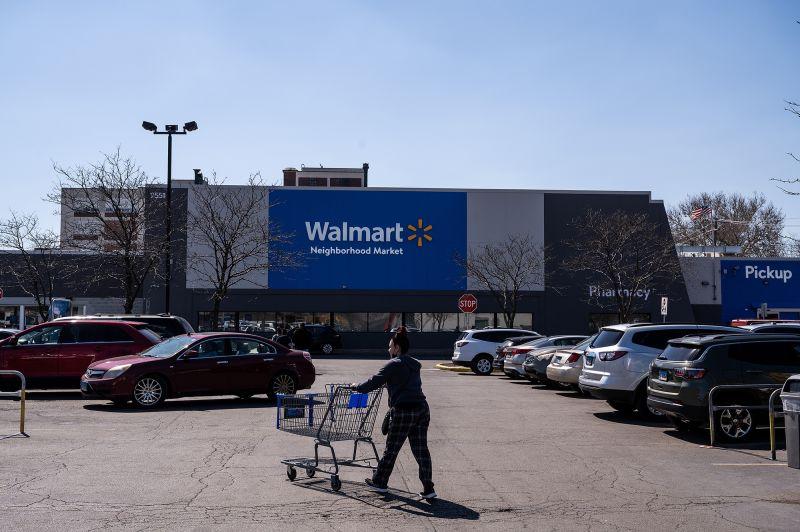What Walmart's pullback from Chicago says about Corporate America's limits | CNN Business
By: Nathaniel Meyersohn (CNN)



New YorkCNN —
A line of Chicago mayors heavily courted Walmart over the last two decades, brushing aside community protests. And Walmart welcomed the opportunity to show cities it could be a strong corporate partner.
But now, Walmart is pulling back from Chicago.
The largest retailer in the country announced plans this week to close four of its eight stores in the city, citing growing financial losses. Three are in predominantly Black and low-income neighborhoods, and their closures with little warning mean residents — including elderly citizens and people without reliable transportation — will have to travel further to buy groceries and pick up their medications.
"These stores lose tens of millions of dollars a year, and their annual losses nearly doubled in just the last five years," Walmart said. Despite years of different strategies, the company said, it did not see a route to profitability for these stores. Walmart, which made $20.6 billion in 2022, did not specify why losses were growing in Chicago.
Chicago Mayor Rahm Emanuel cut the ribbon at the grand opening of a new Walmart in 2013. City leaders saw Walmart as a a way to fill access gaps. Brooke Collins/City of Chicago
City leaders "used a lot of political capital and their trust were questioned, Now it's kind of like, 'I told you so,'" said Chicago Alderman-Elect Ronnie Mosley, who will represent a Chicago ward where one of the Walmarts is set to close. His predecessor, who is retiring, was a major proponent of drawing Walmart to Chicago.
Mayors and key political leaders had pushed to draw Walmart, despite protests from small businesses, labor groups and community activists. Critics pointed to studies that suggested a Walmart presence could push out mom-and-pop stores and drive down wages, as it had in smaller towns.
But, at the time, officials argued opening Walmarts would provide jobs, economic development and convenient places to shop for affordable groceries and pharmacy services in some of the city's low-income communities.
Meanwhile Walmart, which rose mainly in rural and suburban areas, also fought hard to enter Chicago. Walmart saw it as a twofold opportunity: broaden its customer base while proving to skeptical officials in other cities that it was a strong corporate partner.
'I told you so'
The closures are another example of the shortcomings of local governments and even national political leaders betting on leading chains to provide key public services and fill gaps.
If government couldn't provide for a populace in desperate need of jobs and fresh foods, the thinking went, for-profit corporations would.
But in Chicago, that's not what happened. A 2012 study of Walmart's impact in Chicago found businesses closer to Walmart were significantly more likely to close than similar businesses farther away — and the number of jobs lost by nearby retail competitors essentially offset the number of jobs created at the new Walmart stores.
This is a particular issue in predominantly minority, low-income areas that experience economic neglect, and other chains have recently shuttered stores in these areas as well.
Walmart gave less than a week's notice it would close four stores in Chicago. Christopher Dilts/Bloomberg/Getty Images
Whole Foods closed in Chicago earlier this year, along with CVS, Aldi and Save A Lot. In 2019, Target closed two stores, angering residents. Chains like Dollar General and Family Dollar are expanding in low-income areas, but they don't sell fresh groceries.
Unlike local government, which is theoretically accountable to voters, companies answer onlyto their shareholders and don't have an obligation to stay in communities if they aren't making a profit.
Whether it's handing over responsibility for providing public bathrooms to Starbucks and McDonald's or vaccines and basic health services to CVS and Walgreens, the public is left vulnerable when these companies' business priorities change or they close locations.
"We have asked business to solve problems that we don't want government to solve anymore," said Bryant Simon, a professor of history at Temple University who studies the role of Corporate America and government. "We're happy to have them do it and then shocked when they act like a business again."
Solving 'food deserts'
A similar strategy to rely on national chains to help remedy so-called "food deserts" was a focus on the national level during the Obama administration. It too fell short.
Walmart, Walgreens (WBA), SuperValu and other store executives joined Michelle Obama at the White House in 2011 to announce a pledge to open a combined 1,500 stores in communities that have limited access to nutritious food by 2016.
But that effort stalled. The Associated Press found in 2015 that leading chains built just 250 new supermarkets in these areas.
"The assumption there is a single player in the nation that will work in every market is proving to not be true," said Liz Abunaw, who founded Forty Acres Fresh Market, a startup grocer, in response to the lack of fresh food options on Chicago's West Side. "Even in Chicago, the solutions differ by neighborhood."
Placing a big chain in the middle of a struggling neighborhood is not an effective strategy alone, she said, and more holistic solutions are needed, including improving housing, jobs and public transportation: "It's not one thing. All of those things go together."
There also can be unintended consequences to chains opening in neighborhoods. Companies sometimes open, small retailers close - and then the chain closes, leaving a bigger void in some cases than when it first came in.
"The idea that Walmart did the city a great favor by moving in is highly debatable," said David Merriman, a professor of public policy, management and analytics at the University of Illinois Chicago and co-author of the study of Walmart's presence in Chicago.
Instead of relying on large companies to strengthen local economies, some experts say, another solution could be designing policies that better support smaller, family-owned supermarkets, co-operatives, and farmers' markets such as Yellow Banana and ChiFresh Kitchen in Chicago.
"Their loss is one of the main reasons that communities lack grocery stores and other basic retail in the first place," Abunaw said.
Dashed hopes in Chicago
Despite stiff resistance from unions, grassroots groups and some local leaders in Chicago, Walmart has been embraced by the city's last three mayors as an economic development model.
In 2006, Chicago Mayor Richard M. Daley issued a rare veto to override a City Council bill that required big-box stores such as Walmart to pay workers a $10 minimum wage. In 2013, Mayor Rahm Emanuel cut the ribbon on a new Walmart in an underserved neighborhood, saying it was "another example of a company seeing an alignment of what is good for their bottom line with what is good for our neighborhoods."
In 2020, Mayor Lori Lightfoot held a press conference with Walmart CEO Doug McMillon to announce the company would expand its investment in the city following local and national protests over George Floyd's murder by police.
But the company struggled in Chicago. Its mammoth superstores, which are designed for people to drive to and make big shopping trips, have been less suited for city residents who tend to make smaller but more frequent trips to supermarkets.
Walmart tried opening smaller stores, known as neighborhood markets, that serve mostly groceries — but these lower profit margins than other merchandise like electronics or clothing. Walmart is closing neighborhood markets around the country, and three of the four stores closing in Chicago fall into that category.
In Chicago, Walmart is closing in both low-income and high-income areas, a sign that it's struggling across the city. But it's the stores in low-income areas that will feel the loss most.
"We are in an area where CVS and Walgreens have closed," Alderman-Elect Mosley said. "Walmart has become the de-facto" store and the closure is "traumatizing."
"Walmart is leaving and they may be doing what's best for them," he said. "Now I have to figure out with our community what's best for us."

 Article is LOCKED by author/seeder
Article is LOCKED by author/seeder
Tags
Who is online
89 visitors


I fully expect that Wal Mart will be criticized for attending to their bottom line.
Areas that support defunding the police and tolerate high crime will struggle to attract any business with better options. Vote for people like fox and Johnson and their policies and this will be the inevitable result.
And this is why some places can't have nice things
Residents in many low-income city areas depend on their local Walmart, CVS, and Walgreen stores. By ignorantly voting for *defund the police* politicians they continue to hurt themselves.
I saw a correlation between murder rates by precinct in Chicago with the votes for Johnson. The more murders the higher the support for the defund the police candidate. It's incredible to me that the areas with some of the worst violence rates in the world overwhelmingly vote for the politicians dedicated to ensuring the carnage continues.
Funny, but "defunding the police" wasnt mentioned in the article.
Poor neighborhoods are not filled with people who have enough money to go shopping all the time, even at Walmart. It is also true that "mom and pop" shops might give some people credit, where Walmart wont to people with bad credit ratings. The stores that are a step below walmart, so to speak, like Family Dollar might also be eating into potential Walmart business.
There are 69 Family Dollar stores in Chicago, which is second only to Houston for American cities.
Every one of these red dots is a Family Dollar Store. They are preponderantly in lower income neighborhoods.
Notice what they advertise to poor people. Junk food snacks, tv dinners, laundry detergent and air fresheners.
They are too stupid to know the market there, should have advertised:
you're hilarious
So what...what does this have to do with anything"
WTF do you think Family Dollar sells John?
As the article states they don't sell fresh fruits, vegetables, or meats.
Family Dollar sells things it can buy in bulk cheaply- in other words non perishables.
Or should they advertise what they don't sell?
Also, the reason they set up shop in poor areas is that rich areas don't use them. They cater to the poor and less affluent.
I noticed that. Nor is crime mentioned at all. But the article does have a left-leaning slant to it, so maybe that data exists and was omitted. Or maybe it has nothing to do with crime. I dunno.
WalMart is the nation's largest grocer, and more food stamps are spent there than any other retailer. So they seem to be doing fine in other poor neighborhoods.
That's certainly possible.
Theoretically, it's also possible that some of those areas are not as poor as they used to be and people are choosing better quality options than WalMart.
Or it could be cultural. For example, my area of Dallas has a large Islamic population, and there are very few halal offerings at WM, so they shop elsewhere.
As you live there, do you know anything about these locations that would not be apparent by reading the article?
Walmart is joining a line of stores that have left Chicago recently:
That would leave ignorant people to believe that there no Whole Foods, CVS, Aldi, Save A Lot, or Target stores in Chicago, which is nonsense. It was phrased poorly.
There are none on NT
Of course not. all the Walmarts haven't left either
I always welcome your edits, JR.
The red dots are current CVS locations in Chicago. And even this is an incomplete representation due to the limitations of the map.
Isn't the issue more about locations than total number? Aren't there a growing number of fresh food and pharmaceutical deserts in certain parts of the city?
What's your point?
It is extremely hard to be profitable in some places.
Seems like Wal Mart is just making a sound business decision.
Some folks act as if Wal Mart has some sort of obligation to keep unprofitable stores open merely because of the impact closing may have on the neighborhood.
Yes, the closing Walmarts never turned a profit.
I'll give them credit for trying to become profitable there.
Yep, but closing only unprofitable stores does tend to help the bottom line.
Welcome to business 101.
Chicago Mayor Warns That If Local Walmart Locations Close People Will Have Fewer Places To Shoplift
Pretty racist.
Um, you might want to actually read the article before saying that again. Just sayin' !
I read the Babylon Bee article.
Then you know it is satire!
It appears that you read it only after I suggested that you do so in comment 7.1.1. Before that, you said that the article was "racist", even though there's no racism in the article.
I'll take "Stupid Comments" for $100 Alex.
There isn't a single racist part of that SATIRE article. Quit with the games already.